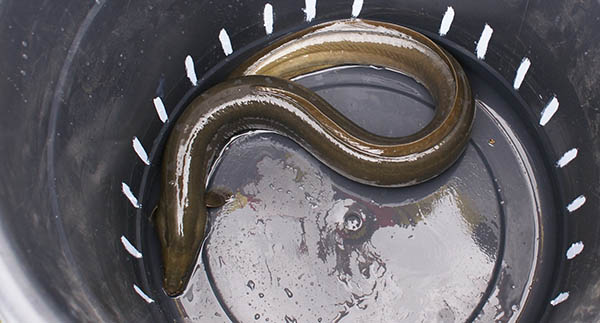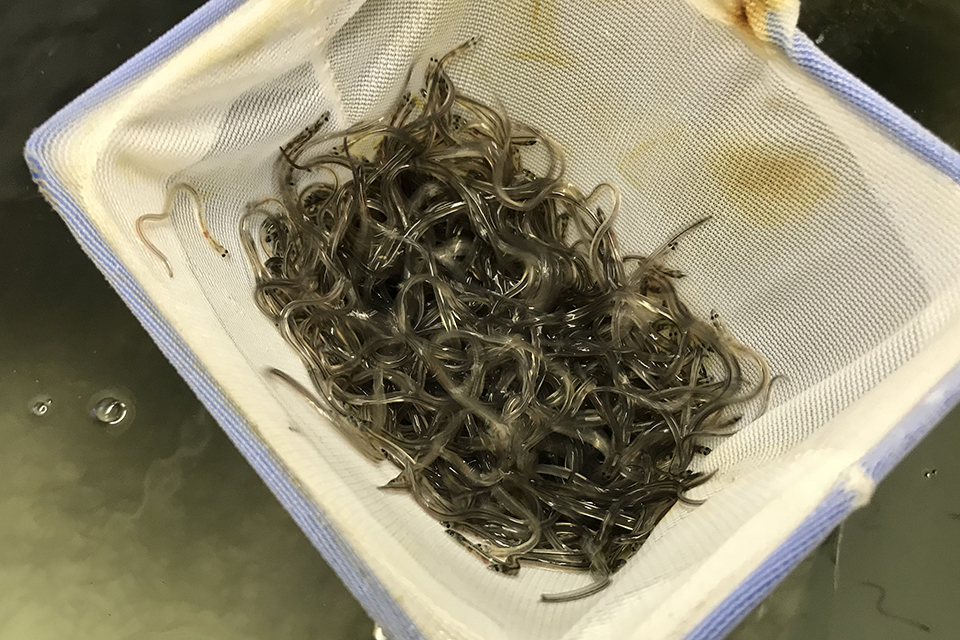Study finds critically endangered European eels on sale in the UK, Europe, North America and Asia

A new study using DNA testing has confirmed widespread – and likely illegal – international trading of critically endangered European eels.
A research team led by the University of Exeter carried out “DNA barcoding” tests on products including jellied eels and unagi, which is used in sushi and donburi. The researchers analyzed 114 samples and combined their results with existing published research, finding European eels – and other endangered and eel species – on sale in the United Kingdom, continental Europe, North America and Asia.
The study, which was published in Food Control, tested eel-based foods in North America and Europe and found that about 40 percent of North American unagi samples analyzed contained European eel.
“It’s hard to track where the eels come from, but it’s unlikely that all of those found in the samples came from the small amounts of legally exported European eels from North Africa,” said Kristen Steele, co-author of the study and Ph.D. candidate at University College London. “It’s very possible that illegal trading brought these eels into the supply chain.”
The study also found a “stark mismatch” between the natural range of eel species and where they were commonly sold. More European eel was found on sale in east Asia than in Europe; and more Japanese eel was found in the UK than in east Asia. As well as concerns over illegal trade and species conservation, this suggests thousands of food miles are “hidden” in eel products.
Most traditional UK eel products sampled, like the jellied eels sold in London’s East End, were made from European eels. Such products may be legal, but they still involve the consumption of a critically endangered species.
“The growing popularity of Japanese cuisine worldwide has caused an increasing demand for freshwater eels,” said Dr. Andrew Griffiths from the University of Exeter. “The complex lifecycle of these eels – which includes migrating from rivers to spawn in the sea – means they cannot be bred at large scale in captivity. So the illegal trade involves catching young eels in Europe, transporting them to East Asia and growing them on in fish farms.”
Follow the Advocate on Twitter @GSA_Advocate
Now that you've reached the end of the article ...
… please consider supporting GSA’s mission to advance responsible seafood practices through education, advocacy and third-party assurances. The Advocate aims to document the evolution of responsible seafood practices and share the expansive knowledge of our vast network of contributors.
By becoming a Global Seafood Alliance member, you’re ensuring that all of the pre-competitive work we do through member benefits, resources and events can continue. Individual membership costs just $50 a year.
Not a GSA member? Join us.
Author
-
Responsible Seafood Advocate
[103,114,111,46,100,111,111,102,97,101,115,108,97,98,111,108,103,64,114,111,116,105,100,101]
Tagged With
Related Posts

Intelligence
American Unagi breaks ground on land-based eel farm in Maine
Eel producer American Unagi has broken ground on a 27,000-square-foot recirculating aquaculture system near the coast of Maine.

Intelligence
Reinventing the eel: Can the Anguilla loop be closed?
Japanese scientists have been trying to replicate spawning conditions for eels in captivity for decades. They’re getting closer, but major hurdles remain.

Innovation & Investment
American Unagi brings eel farming back ‘home’
Sara Rademaker launched American Unagi to shift eel farming to American soil, where the eels are from. Why? Because of the novelty, and because she saw an opportunity to do things better.

Innovation & Investment
Super intensive recirculating eel culture systems in Taiwan
Continuous innovation of production systems can make eel culture sustainable, environmentally friendly and economically viable.



